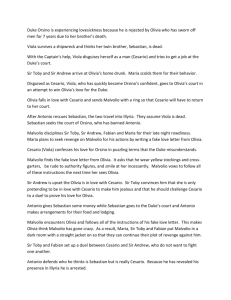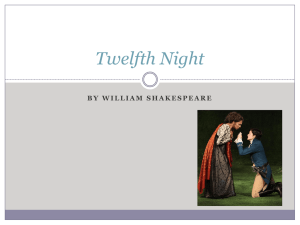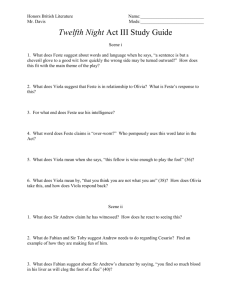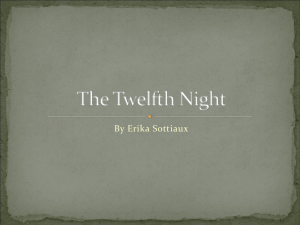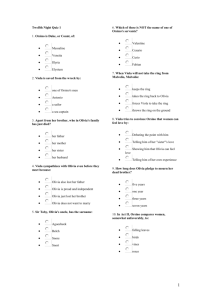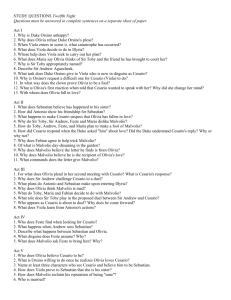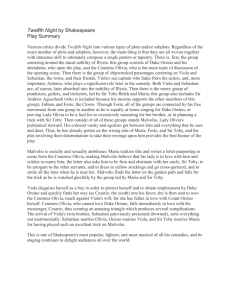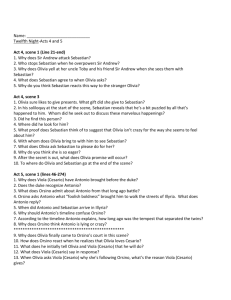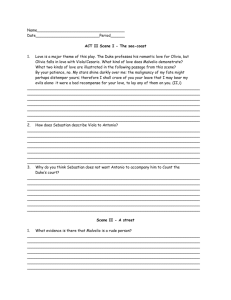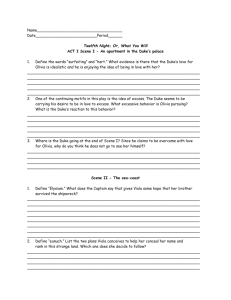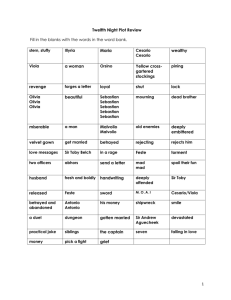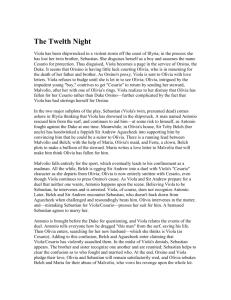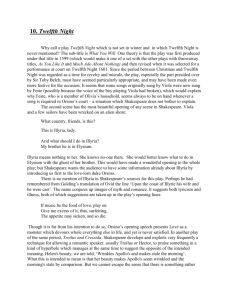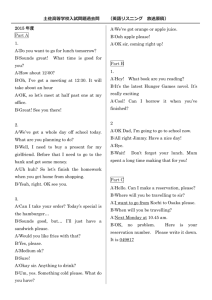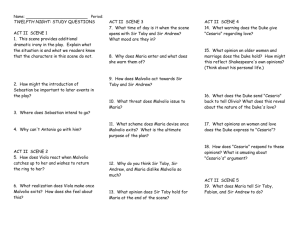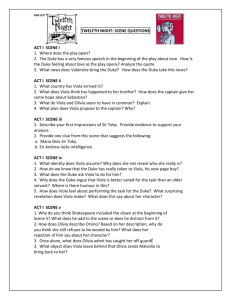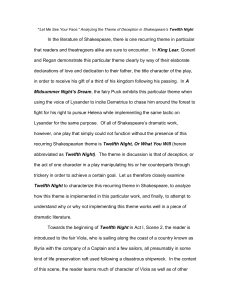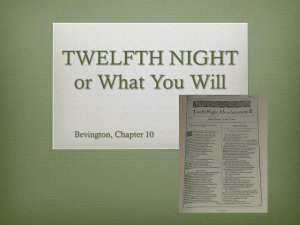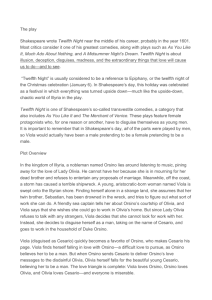Audric Wang`s TWELFTH NIGHT Essay (Honors)
advertisement
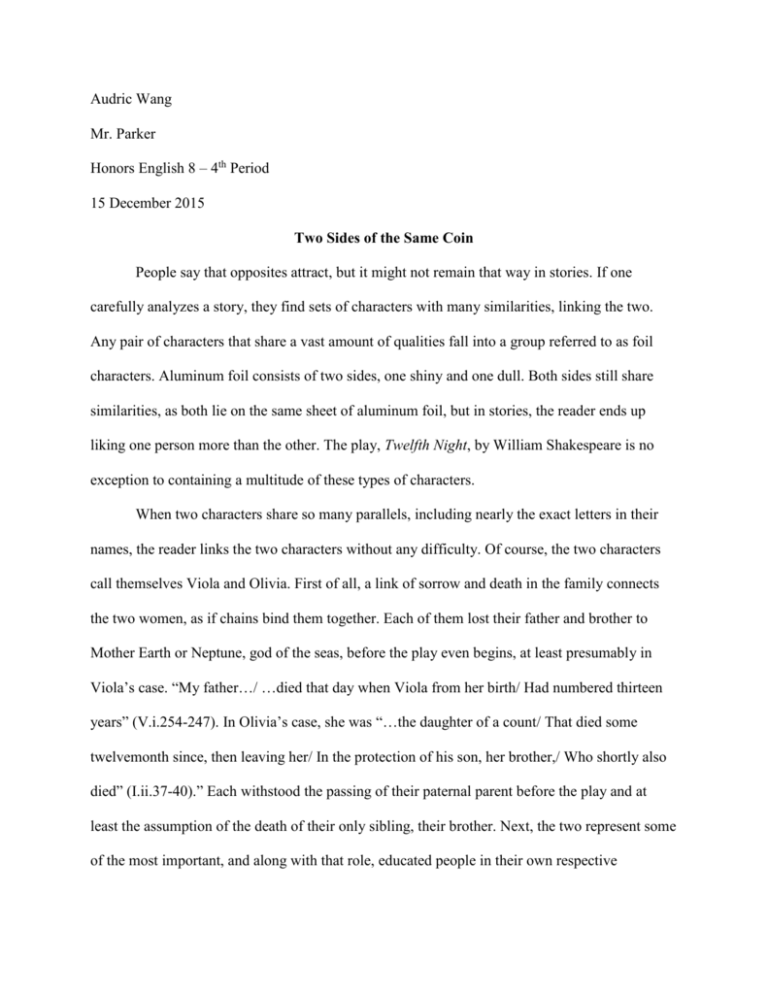
Audric Wang Mr. Parker Honors English 8 – 4th Period 15 December 2015 Two Sides of the Same Coin People say that opposites attract, but it might not remain that way in stories. If one carefully analyzes a story, they find sets of characters with many similarities, linking the two. Any pair of characters that share a vast amount of qualities fall into a group referred to as foil characters. Aluminum foil consists of two sides, one shiny and one dull. Both sides still share similarities, as both lie on the same sheet of aluminum foil, but in stories, the reader ends up liking one person more than the other. The play, Twelfth Night, by William Shakespeare is no exception to containing a multitude of these types of characters. When two characters share so many parallels, including nearly the exact letters in their names, the reader links the two characters without any difficulty. Of course, the two characters call themselves Viola and Olivia. First of all, a link of sorrow and death in the family connects the two women, as if chains bind them together. Each of them lost their father and brother to Mother Earth or Neptune, god of the seas, before the play even begins, at least presumably in Viola’s case. “My father…/ …died that day when Viola from her birth/ Had numbered thirteen years” (V.i.254-247). In Olivia’s case, she was “…the daughter of a count/ That died some twelvemonth since, then leaving her/ In the protection of his son, her brother,/ Who shortly also died” (I.ii.37-40).” Each withstood the passing of their paternal parent before the play and at least the assumption of the death of their only sibling, their brother. Next, the two represent some of the most important, and along with that role, educated people in their own respective countries. When giving Olivia’s ring to Cesario, Malvolio says, “Were not you even now with the Countess/ Olivia?” (II.ii.1-2). Based on Viola’s education and talent, she appears to originate from nobility in Messaline, where she and Sebastian hail from. On multiple accounts, a character refers to Olivia as the Countess, and it states that a deceased count fathered her, meaning she pertains to higher status in Illyria. Finally, both of these characters possessed or retain a romantic relationship with Orsino, or the Duke, a title commonly used to refer to him. “O, when mine eyes did see Olivia first,/ Methought she purged the air of pestilence” (I.i.20-21). Though in Olivia’s case, only Orsino loved her, Viola created a mutual bond between Orsino and herself. At first, since Orsino thought they shared a gender, only Viola loved the Duke. Once she reveals her true identity, Orsino accepts the fact Olivia harbored no feelings for him and allows Viola to become his queen. Each woman holds much power in the palm of her hand. Each suffered terrible losses with direct family. Each romantically intertwined not only with Orsino, but with each other, while Viola disguised as Cesario. The similarities undeniably associate the two characters on a deeper level than being acquaintances or friends. People usually identify twins easily through physical appearances, but the pair of siblings in Twelfth Night share more qualities than most. Sebastian and Viola, or her male counterpart, the eunuch Cesario, cause confusion about their identities near the end of the story. A good example of how they appear as seemingly foil characters lies in the most obvious resemblance, their appearance. “An apple cleft in two is not more twin/ Than these two creatures. Which is Sebastian?” (V.i.234-235). Antonio, who nursed and cared for Sebastian like a loving mother with a child for 3 months after the shipwreck takes troubles in differentiating between the Cesario and Sebastian. A better instance of their sameness dwells in the causation of their dilemma of being trapped in Illyria. “Assure yourself, after our ship did split,/ When you and those poor number saved with you/ Hung on our driving boat, I saw your brother…” (I.ii.10-12). Both arrived on the same boat and landed on different parts of Illyria, as the sea captain confirms Sebastian also resided on the boat, saying he acted bravely. The best correlation between Cesario and his brother rests in the same boat as the previous example. Each presumes the other to have died during the shipwreck. Sebastian remarks when meeting Cesario for the first time, “I had a sister,/ Whom the blind waves and surges have devoured” (V.i.239-240). In response, Viola says, “Such a Sebastian was my brother too./ So went he suited to his watery tomb” (V.i.244-245). Both twins lived in Illyria, with the thought of their equal undoubtedly dead. Confusion ensues due to this assumption, relationships with the other’s acquaintances altered as a result. Twins commonly act alike in many cases, but Cesario and Sebastian take this to a whole new level. Experiences, as well as physical attributes, cause the view that they might as well be the same person. Best friends spend a lot of time with each other, consequentially influencing each other in some way. Sir Toby and Sir Andrew act as very close companions throughout the whole play, drinking and spending time with each other. It appears as if they rubbed off on each other more than the average set of comrades. To begin, Sir Toby and Sir Andrew drinking together, spending boatloads of time and money at the pubs, occasionally with others. “…he’s drunk nightly in your company,” states Maria while talking to Sir Toby about Sir Andrew (I.iii.36-37). The pair often returns to Olivia and Sir Toby’s estate after becoming intoxicated, causing more noise than a storm. Their drunkenness actually causes the next example. Sir Toby and Sir Andrew both involve themselves in the prank directed towards Malvolio. Once Maria finishes explaining her plan, Sir Toby says, “Excellent! I smell a device” (II.iii.161). Sir Andrew immediately replies, “I have ’t in my nose, too” (II.iii.162). When the two come back after a night of drinking, Malvolio tries to use more power than he possesses, causing Maria and the two bumbling drunks to grow angry. They retaliate with a trick, causing Malvolio to believe that Olivia loves him. The final example resides in Sir Toby Belch’s and Sir Andrew Aguecheek’s surnames, specifically how their names describe them. “…here comes Sir Andrew Agueface” (I.iii.43). Sir Toby uses Agueface as a replacement for Aguecheek, with the word ague meaning feverous. This implies the coloration of Sir Andrew’s face appears redder than usual, like somebody with a fever, possibly acting as a reference to his drunkenness or possibly how he constantly embarrasses himself directly as a result of his unintelligence. Belch obviously refers to Sir Toby’s drinking habits. From the hobbies the two partake in together to the mocking surnames intending to make fun of the rich for the entertainment of the lower class watching the play, denying the similarities between the pair of close friends seems unlikely. Foil characters appear everywhere in one of Shakespeare’s most notable and comedic plays, with many not mentioned or maybe even recognized by most people. The densely packed play fits a lot of characters into the plot, with many basic ideas between two characters overlapping with another’s. Olivia and Viola both caught the eye captured the heart of Orsino. Cesario and Sebastian thought the other to reside at the bottom of the ocean. The close friends of Sir Andrew and Sir Toby hold more things in common than meets the eye. The last names of each ridicule the owner of it. These characters live on two sides of the same coin. Readers of this play think of a close friend they spent a lot of time with, or their sibling. Possibly even their rival comes to mind. One notes their own similarities with another they know and see if they possibly are, for lack of a better term, foil people.

